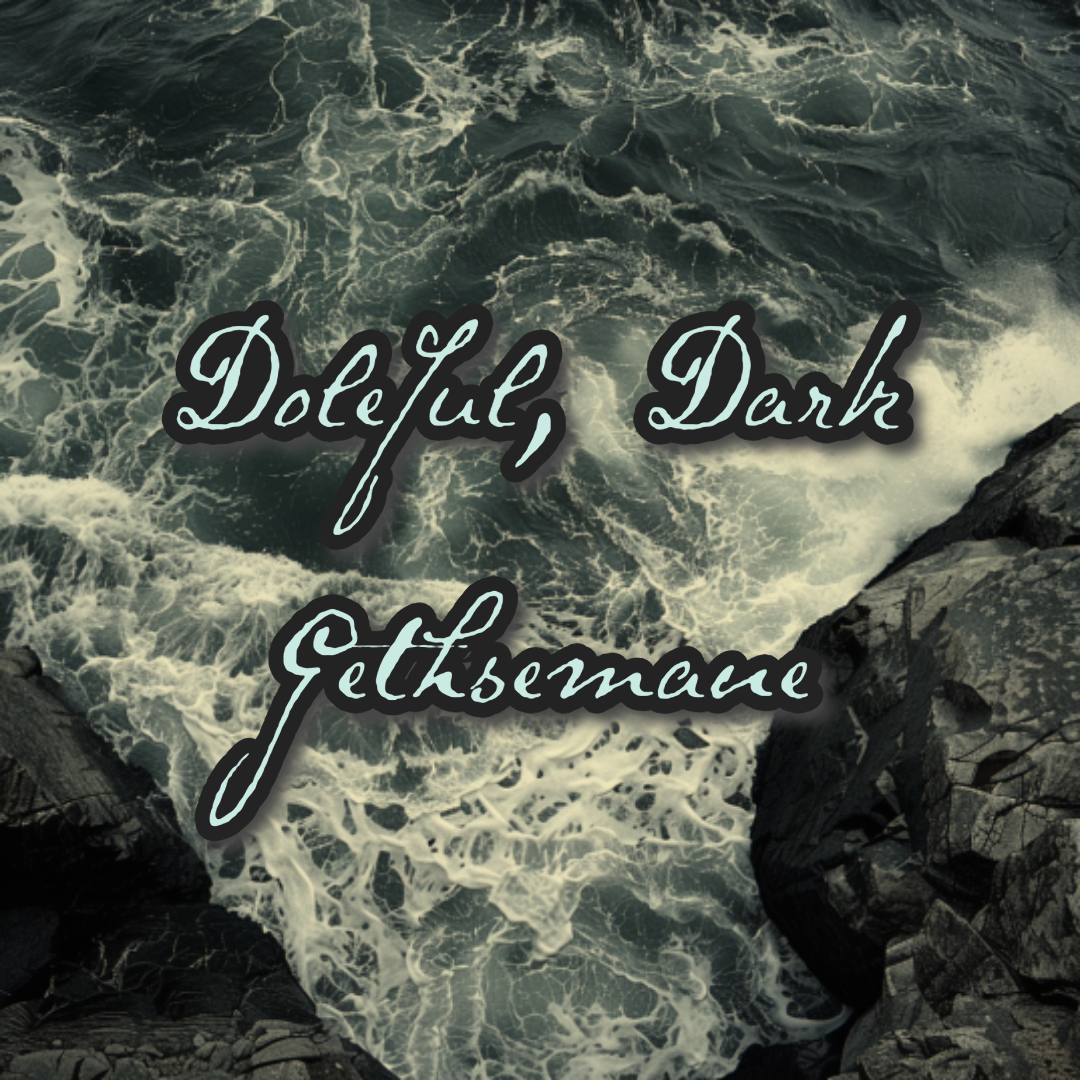Doleful, Dark Gethsemane
39 And He came out and went as was His custom to the Mount of Olives; and the disciples also followed Him. 40 Now when He arrived at the place, He said to them, “Pray that you may not enter into temptation.” 41 And He withdrew from them about a stone’s throw, and He knelt down and began to pray, 42 saying, “Father, if You are willing, remove this cup from Me, yet not My will, but Yours be done.” 43 Now an angel from heaven appeared to Him, strengthening Him. 44 And being in agony He was praying very fervently, and His sweat became like drops of blood, falling down upon the ground. 45 And when He rose from prayer, He came to the disciples and found them sleeping from sorrow, 46 and said to them, “Why are you sleeping? Rise up and pray that you may not enter into temptation.”
Luke 22:39-46
There my God bore all my guilt;
This through grace can be believed;
But the horrors that he felt
Are too vast to be conceived.
None can penetrate through thee,
Doleful, dark Gethsemane.
None can penetrate through thee,
Doleful, dark Gethsemane.
-“Many Woes Had He Endured” Joseph Hart, 1712-1768
The deeper truths of the turmoil and torment of our Lord in Gethsemane swirl in a depth of mystery just beyond our comprehension. Like gazing from rocky cliffs into deep black waters as cascades of white-foamed torrent crash against, we will never gain a clearer peering in. They bid us return to thinner waters and safer shores, as some mysteries are reserved for the purpose of wonder.
In becoming the scapegoat and substitution, he would bear the weight of both the dark legacy and future exploits of sin, and utter separation from God. It was a death more thorough than any of us can fathom; a true death. A rending not only of soul from body, but of nature from self. He was both son of God, a triune mystery, and second Adam, the perfect and undefiled man. Yet, he would be abandoned and forsaken. Eloi, Eloi, lama sabachthani? which is, being interpreted, My God, my God, why hast thou forsaken me(Mark 15:34, ref Ps 22:1)? It was a terror only the God-Man himself could in some way comprehend. It was pure and holy horror.
Beholding the cup set before him, he groaned under the weight(Heb 5:7). His agony in obedience was so thorough that he requested the cup might pass from him. As Jesus admonished his disciples to “Pray that you may not enter into temptation,” he would face his own, in exponential intensity. In both exerting and surrendering his will to obey his Father, he sweat drops of blood, a physical phenomenon reserved for the most excruciating angst and pressure. Mark reveals that his grief was so profound, it was to the point of death:
And He said to them, “My soul is deeply grieved to the point of death; remain here and keep watch.” -Mark 14:34
And here contrasted, we see them all; He praying while his nearest disciples in Gethsemane rest. Luke tells us they are sleeping for sorrow, so they are not wholly ignorant of the encroaching darkness. Yet, we find them in some physical repose, while Christ is in restive distress. So thorough was his suffering in Gethsemane that an angel was sent to comfort and strengthen him. The God who created the hosts of heaven to be his messengers and worshipers would require their assistance to endure his self-appointed affliction. So thorough was his humiliation in his humanity, the writer of Hebrews notes, But we see Jesus, who was made a little lower than the angels for the suffering of death(Heb 2:9).
Which would be our example, humility or hubris? Those revered men were only hours prior bickering over who would be the greatest in God’s kingdom, swearing unwavering faith, “Lord, with You I am ready to go both to prison and to death!” Meanwhile, our messiah struggled under the weight of the kingdom’s cup, pleading that the Father might remove it from him. Greatness in the kingdom would be established in measures of humiliation. Those sainted apostles would be scared, scattered and sifted by Satan(Luke 22:31), failing in shameful degrees before being risen again at Christ’s beckoning(John 21).
There were two wills in Gethsemane; Thy will, resolved to suffer and die for the Father’s purposes, and my will to recline in convenience and complacency. One will that would embrace death, and one that would draw a sword to defend against it. Each will is thorough in its effect.
A cup of wrath consecrated by “Not my will but thine be done,” would kill death’s curse, crush the serpent head, and reorder eternity. “Not my will but thine be done,” would be the faith-filled proclamation that made straight the way of both His and our resurrection.
Which will reigns in our hearts? As we celebrate the resurrection of our Lord and the fulfillment of our deepest hopes, a commission yet lies before us. Will we receive the news of our restoration and eternally resurrected life in Christ with a will to serve our great Savior? Or will we surrender to a complacent and comfortable life, free of the more difficult obediences? Will we praise him with our lips on Resurrection Sunday while exerting our own wills on Monday? What will His resurrection be unto for you? Service or self, longsuffering or luxury? May our hearts be wound up with His in Gethsemane, that our wills would follow.
21 And after they had proclaimed the gospel to that city and had made many disciples, they returned to Lystra and to Iconium and to Antioch, 22 strengthening the souls of the disciples, encouraging them to continue in the faith, and saying, “Through many afflictions we must enter the kingdom of God.”
Acts 14:21-22
